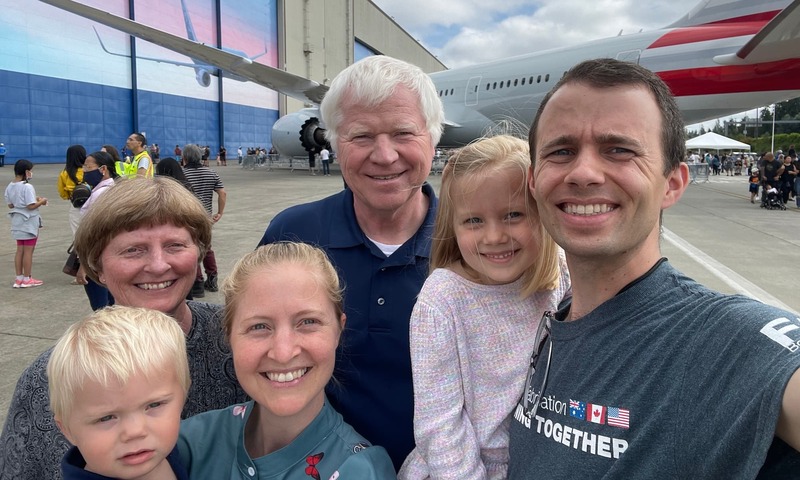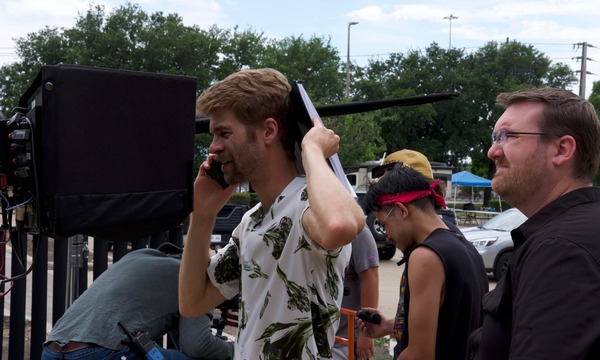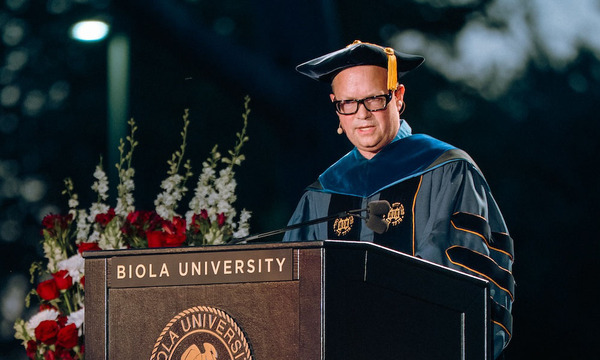As a procurement strategist at a top aerospace company, alumnus Cory Cress (ŌĆÖ07) has helped source some of the most important materials on a variety of aircrafts that move passengers and goods around the world. He revels in the details and has learned to love the double- and triple-redundant engineering that is standard in the aerospace industry.
.jpg)
ŌĆ£You pick up a toaster sometimes and you feel like itŌĆÖs just going to fall apart, but you pick up a part thatŌĆÖs made for aerospace, and you can just feel that itŌĆÖs going to last at least 50 years,ŌĆØ he said.
It is likely that in 50 years from now, a number of aircraft will still be in the sky with traces of CressŌĆÖ work in service.
ŌĆ£My faith in God is central to my life, so I want to do my work to the highest standard,ŌĆØ he said.
As the Composite Strategy Leader at The Boeing Company, Cress spends his days imagining and designing strategies for using the most advanced materials in the aerospace industry. In this highly technical field of work, Cress recognizes how the values Biola instilled in him provide opportunities to glorify God.
ŌĆ£When IŌĆÖm at work, IŌĆÖm thinking, ŌĆśHow can I honor the Lord with my work?ŌĆÖ That was something that Biola, my family and my church community have nurtured in me,ŌĆØ said Cress.
CressŌĆÖ path to pursuing a career in aerospace began at 91Ų▐ėč, where he studied mathematics from 2003-2007. He grew up hearing about Biola from his parents and several aunts and uncles who were all alumni. During a visit to Southern California, he decided to apply.
While he was at Biola, Cress served in student leadership, including a term as Student Government Association president. Cress looks back on his extracurricular activities as a ŌĆ£leadership labŌĆØ that taught him some of his most important lessons.
ŌĆ£I learned by example about treating other people with love and care, and really hearing them and connecting with them. People want to be heard ŌĆ” That servant-leadership mindset was the most important thing I learned at Biola ŌĆö serving others, leading by example, doing the dirty work yourself instead of delegating it.ŌĆØ
But his most vivid memory came with the onset of an acute illness that left him in the hospital and wondering if he had leukemia.
ŌĆ£My parents flew down from Seattle, picked me up at the dorm and drove me to the hospital,ŌĆØ said Cress. ŌĆ£While I was in the hospital for five nights, two of my professors came to visit me ŌĆö Bible professors, and I wasnŌĆÖt a Bible major. I also had a lot of friends who made a ŌĆśGet Well CoryŌĆÖ banner and hand-written notes. At one point, the nurse came in and was like, ŌĆśWhoa, this is a lot of visitors, we need to let Cory get his rest.ŌĆÖ But I was super supported by this community, with physical presence, with prayer, and with a ton of grace when I got back ŌĆö extra time to make up assignments I had missed. But it was especially touching to be prayed for by Dr. Edward Klink and Dr. Kenneth Berding with my family in the hospital.ŌĆØ
Looking back on that health crisis, Cress reflects on what it taught him about the value and the meaning of real community.
ŌĆ£No college or workplace or school or church is perfect, but I have overwhelmingly positive memories of Biola,ŌĆØ Cress added. ŌĆ£I was a thousand miles away from Seattle, but I felt at home, I felt comfortable.ŌĆØ
After graduating from Biola in 2007 with a degree in mathematics and a teaching credential, his first job was as a substitute teacher, followed by working five years at Makita USA, the power tool company headquartered two miles south of Biola. At one point while he was working there, six to seven Biola alumni were there as well.
Near the end of his time with Makita, a friend from Biola who had gone to work at BoeingŌĆÖs plant in Long Beach reached out to Cress. He applied and landed a contractor position. Six months later, Boeing brought Cress on full-time. He learned the aerospace and aviation industry on the job and eventually transferred to Seattle and began to specialize in carbon fiber and other high-end composite materials.
ŌĆ£This is what you make satellites and high-end mountain bikes and airplane wings out of,ŌĆØ he said. ŌĆ£IŌĆÖve really enjoyed making things practical. ItŌĆÖs not just nameless people on a page or numbers in a catalog. I want to touch and see and feel. So I would spend time with our engineers at our factory, at our suppliersŌĆÖ factory, and just see and touch this stuff. My favorite part of my job is this world where there are numerous nerdy details ŌĆö all the key characteristics: compression after impact, fiber aerial weight, all these things that determine performance,ŌĆØ said Cress.
Going back to his earliest days at Biola, Cress recalls how some of his most formative moments on campus were unscripted and unprogrammed ŌĆö late-night worship nights in his dorm room and doing life together in friendship.
ŌĆ£Biola equipped me to not be scared of asking questions, to not be scared of doubt and inquiry,ŌĆØ said Corey. ŌĆ£You can seek the Lord in prayer and seek answers without deconstructing your faith into oblivion. You can say, ŌĆśThis is hard, and I need answers.ŌĆÖ Seeking doesnŌĆÖt mean abandonment. ItŌĆÖs that man who said, ŌĆśI believe, Lord, help me with my unbelief.ŌĆÖŌĆØ
Learn more and apply to 91Ų▐ėčŌĆÖs B.S. in Mathematics.
 91Ų▐ėč
91Ų▐ėč
.jpg)

.jpg)
